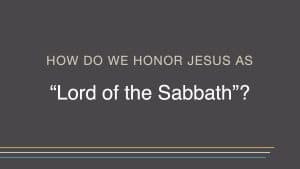Jesus is “Lord of the Sabbath,” which means he reigns over our day of rest. God uses our submission to his lordship to restore our souls.
I am the deacon of teaching at Harpeth Christian Church, and I preached a sermon on Luke 6:1–11 called “Lord of the Sabbath” at my church. Watch or read the sermon here.
While we can learn about Jesus as “Lord of the Sabbath” in three of the four Gospels of the New Testament, I use Luke 6:1–11 for this post. For more, my book Your Spiritual Formation Plan here contains a whole chapter on rest.
Exposition of Luke 6:1–11
Let me explain some background to each verse for context (commentary style), and then I’ll unpack the meaning of “Lord of the Sabbath.” You can skip straight to the practical meaning (see section below “Honoring Jesus as Lord of Our Rest”).
Luke 6:1: This verse reveals how the disciples were essentially eating grain like we eat granola for a snack. This was okay to do according to the Old Testament law. That is, taking someone else’s grain was not wrong, according to Deuteronomy 23:25, which says, “If you enter your neighbor’s grainfield, you may pick kernels with your hands, but you must not put a sickle to his standing grain.”
Luke 6:2: The challenge from the Pharisees, however, had to do with their “law.” The disciples’ actions were not a clear violation of the Sabbath according to the Old Testament.
Religious Jews of the time held different perspectives about it. The Pharisees held one set of traditions, and others—like the priests who served as judges in local courts—held another view and might have been fine with the disciples’ actions here.
The fifth-century rabbinical document called the Mishnah gives us a hint as to what the Pharisees of the first century taught about Sabbath. So at the risk of anachronistically reading back into first-century tradition, I’ll say that Shabbat 7:2 reveals “no reaping” as a law for Sabbath-keepers. This was one of the 39 unlawful practices (40 laws minus 1) on the Sabbath according to rabbinic oral tradition of the fifth century, which may go back to the first century to some degree.
The Pharisees accused Jesus of violating a man-made law, not the law of God found in Scripture.
Luke 6:3–4: We learn in Leviticus 24:8–9 that the “showbread” was to be set out every Sabbath, and only Aaron and his sons were to eat it.
Yet David was an exception to this (see 1 Samuel 21). The story of David and Ahimelech at Nob reveals some parallels between David and Jesus. So we can infer that Jesus implicitly said to the Pharisees, You know how David took exception to a law and used his authority as an incumbent king to “break a law?’” How much more so with me!

The parallels are:
- Both men supposedly traveled with their companions.
- Both groups needed bread (or “pre-bread,” grain).
- Both men broke a commonly held notion with regard to Sabbath-keeping.
- Both men had an enemy (David’s enemy was Saul, and Jesus’ enemy stood in front of him).
- Both had been anointed as king.
Jesus put himself on par with King David.
But Jesus went a step beyond to show his authority in Luke 6:5: “Then Jesus said to them, ‘The Son of Man is Lord of the Sabbath.’”
This leads to the question at hand:
What does it mean that Jesus is “Lord of the Sabbath”?
- It doesn’t mean what the Pharisees understood about the Sabbath.
- Also, it doesn’t come with the regulations and rituals of the Old Testament law.
- Plus, it’s not a loose understanding of Sabbath, where you do whatever you want on your day off.
The meaning of Jesus as Lord of the Sabbath starts with the fact that Jesus is Lord in general.
The Meaning of ‘Lord of the Sabbath’
We would expect the Gospel of Luke to contain the gospel—and yes, it does!
Matthew Bates nails it when he says in Gospel Allegiance that the gospel in summary form is simply: Jesus is the saving Christ.
That statement is dense, and I unpack Bates’s meaning of that statement in my review of his book here.
To say Jesus is “the Christ” is like saying he’s “Lord.”
That is, the Gospel of Luke as a whole describes Jesus’ lordship as Messiah. This story in particular reveals how:
Jesus reigns over the Sabbath.
That is, he’s Christ the king, Lord of the Sabbath.
And his kingship extends even over our day of rest as his disciples. Jesus’ statement “The Son of Man is Lord of the Sabbath” in Luke 6:5 means “The Sabbath is under my dominion as the Messiah.”
Must Christians Obey the Sabbath?
But aren’t we under the new covenant, where the Sabbath doesn’t matter? you might wonder. Isn’t the Sabbath a part of the Old Testament and not the New Testament?
While I answer this question in more detail in my article “Sabbath Rest: Why and How Christians Should Embrace a Literal Day of Rest Each Week,” I’ll share my bottom line conclusion here:
Our day of rest is a gift to be received, not a law to scrutinize.

Jesus claims to rule over our rest, not to abolish the practice of it entirely.
I don’t think he would have followed his claim to be Lord over our day of rest by saying, “But don’t worry about it. It’s not important.”
He wasn’t dismissing the Sabbath; he was defining it.
So as disciples, part of submitting to Jesus as Lord is submitting to how he wants us to practice rest—which is for our good.
How can we apply this to our lives today?
Let’s understand the core of God’s heart about the Sabbath, and then get practical with a two-step framework.
The heart of God about the Sabbath comes to us through the next story in this passage—the story of the man with the withered hand.
The Man With the Withered Hand
This story comes to us in Luke 6:6–12 (and two other Gospels).
Luke 6:6: It’s likely that the withered hand was his dominant hand, since Luke went out of his way to include the detail “right hand.” Perhaps Luke was emphasizing that his withered hand prevented this man from making a reasonable living wage.
Luke 6:7–8: How vulnerable the man must have felt standing in front of everyone! The gift of receiving God’s grace can feel vulnerable.
Luke 6:9–11: Consider what Jesus was teaching those in attendance. He was redefining the Sabbath around himself, helping them move from a law-based understanding of obedience to a person-based obedience.
What did the law say about healing a hand on Sabbath? Nothing.
The Pharisees focused so much on the minutiae that they missed the forest for the trees.
They had traded their traditions about the law for a new law and forgotten the lawgiver.

They had lost sight of God himself, and they had also lost sight of the value of a person.
Watch a segment of my message here, where I tell the story of a day I almost died—literally!—and learned in a fresh way how God cares about me.
Let me say this: God cares about you immensely.
You are so valuable to him. Do you know his heart for you? He wants to save and restore you!
That’s his core desire for us on the Sabbath: to bring healing, restoration, and renewal.
The heart of God about rest can be especially hard to understand for those of us who like clean categories, sometimes called “black and white” thinking. But if we’re to live the full life God intends for us, we must enter into the nuance.
We must redefine our understand of Sabbath and resting around Jesus.
So what does it mean for us today that Jesus is “Lord of the Sabbath”? And how do we honor Jesus’ lordship in this way?

Honoring Jesus as Lord of Our Rest
Let me first say that we don’t follow Sabbath according to Pharisaical tradition.
Instead, we must seek God’s heart about it. So I sometimes call the Sabbath simply “a day of rest for Christians.”
I suggest Christians still honor Jesus as Lord of the Sabbath by resting for a set period of time each week. This involves a two-step framework, if you will, that will help us restore rest into our lives today.
Step 1: Saying No
1. Reject the world’s definition of rest.
The world has created its own rules about rest: what it takes to be a whole human being. But God’s definition of wholeness must be different. These rules are:
- You must look a certain way.
- You need to make a certain amount of money.
- You should watch the right movies and sports.
- You need a hobby (especially one that’s expensive).
- Your yard should look a certain way.
We typically enact these rules in our time off—our rest time.
We can turn these cultural rules, among others, into a sort of “cultural legalism” that enslaves us to spend our leisure time serving the god of self, instead of the true God.
Let’s reject the world’s definition of rest and embrace God’s rest.
“Cultural legalism” is going beyond God’s requirements and putting unnecessary burdens on one’s self.
By this legalism, we force ourselves and others to:
- Do too much.
- Be too much.
Cultural legalism tempts us with the broken record that plays on repeat, More, more, more. Go, go, go. Progress, progress, progress.
The result of this legalism is idolatry. We’re never enough, don’t feel loved, and our lives are a busy mess.
2. Assess our traditions of rest against God’s heart.
We also need to measure our traditions about rest to see how they align with God’s heart. Our families, churches, and groups can adopt certain traditions of rest that may not align with God’s heart.
For example, we can spiritualize our busyness: We feel like we must do everything all the time without question. But spiritual activity doesn’t equal spiritual discernment. We must submit even our activities of rest to the lordship of Jesus.
What does Jesus want us to do on our day of rest?
Typically, I see Christians fall off the boat in two ways. Either they 1) serve too much and don’t rest, or 2) they rest but in a self-serving manner, without even asking how God wants them to spend their time off work.
For example, recently I was tempted to work too much on my day of rest. I was given one more opportunity than I had planned for the day. When I did the math, it was going to put a lot of stress on my family—just with scheduling—and no one knew that fact except my wife and me.
So we presented it to the Lord, ready to make the sacrifice, but we sensed as we prayed for the heart of God—that it wasn’t the right decision for us that day.
On the other side, let me say that if you serve God wholeheartedly and with a generosity of time and resources, way to go! That’s great.
But if you have a hard time saying no, be careful—you might burn out! If you’re not careful, you could put your activities for God over the person of God.
Remember, we’re human beings, not human doings.
We need the rest of God.
On the other hand, if you’re proficient at resting, way to go!
If that’s you, however, let me ask this: Are your traditions—say with family or otherwise—what God wants you to do on the day of rest over which he reigns? Assess your traditions of watching the game or taking a nap on Sunday afternoons, for example. These might be okay for you to do, but have you made room for God to direct you on your day of rest? What’s his heart for you and your family?
3. Set aside our personal preferences about rest in exchange for God’s heart.
While we might prefer, on our day of Sabbath rest, to watch movies or sports, to sunbathe or sleep in, to go out to eat or order in, to take a nap or take up a new hobby—these are our personal preferences. Maybe we’d rather be at home when our small group is meeting.
Maybe we’d rather go hiking and stream the church service on our phone in the car on the way to the hike than go in person, where we can be a blessing and not just receive a blessing.
None of those activities are wrong by themselves, and perhaps they’re fine for the day of rest. However, we must be willing to set aside these personal preferences for God’s will in order to be ready to submit to Jesus’ lordship here, as he guides us.
Protecting Ourselves and Our Time
We mean well, too, but sometimes we’re more like the Pharisees than we realize. They tried to protect their tradition and their people. In like manner, we too try to preserve our lives in various ways, but when we allow the ways of the world to become our ways—as I’ve described above—we need to seek afresh God’s ways.
We can discern his ways by hearing God’s heart as revealed through the life and teachings of Jesus. Plus, we can ask God, “What would you have of me today so I can rest in you?”
In the end, the world’s way, our traditions, and our personal preferences can sometimes unknowingly lead to death and destruction instead of life and restoration. It all depends on whether or not we’re aligned with the heart of God with regard to rest.
We must be ready to set all that aside for the heart of God for us.
So rest starts with saying no to the world’s definition of rest.
I suggest setting aside a specific amount of time each week, preferably on a particular day of the week and preferably when others in your community are doing it and you don’t have to go to work—to stop your regular work and rest in God.
Sunday has traditionally been the day Christians rest together to remember God. Nothing in Scripture legislates this, but it’s a common and helpful habit throughout church history.
Some tips for your day of rest:
- Request off work, communicate with your family about the details of the day, and make plans with other believers.
- Set boundaries around this time, and while you can remain flexible, don’t make a habit of bending the boundaries you’ve set before God.
- Perhaps make it possible not to check your email or take care of yard work.
- If possible, complete tasks such as preparing food beforehand, so you can focus your attention directly on God.
- My personal rule of thumb, in case it helps you: Say no to whatever gets in your way of true rest so you can say yes to God
This is the next step in honoring Jesus as Lord of our rest.
Step 2: Saying Yes
The second step toward rest is saying yes to God.
When possible, focus your engagement with God during your day of rest on three activities with God’s people.
As I study the heart of God in the Bible with regard to rest, especially what the people of God did in the book of Acts, I see three simple, common practices for practicing a day of rest in community:
- God’s People
- God’s Word
- God’s Spirit
Notice that true rest in God is about the person of God, not rules from God.
We can engage these practices by:
- Being with God’s people on the day of rest.
- Reading the Word together on the day of rest.
- Seeking God’s Spirit by praying together on the day of rest.
So try to make places to engage each of those on your weekly day of rest.
1. Being with God’s people.
- Let’s gather together.
- Let’s greet one another with a holy hug.
- Let’s be together to sit and rest in fellowship.
I can’t stress how important it is for Christians to see each other every week. In a world starving for community, be that consistent person who always shows up to church gatherings, ready to serve and receive.
2. Reading the Word together.
Many churches hold high the Word of God during Sunday worship.
But what about in small contexts for connecting deeper in God’s Word?
Sit down with your family or a group from the church to read Scripture. Some of the best God-centered discussions happen when you simply hang out with God’s people. Remember, make this day fun and something you look forward to!
Tips:
- Read short portions of Scripture, at a minimum.
- Read long portions of Scripture, if possible.
- If you have young kids, act out Scripture stories.
As best you can, make the Word a vital part of your day of rest.
3. Seeking God’s Spirit by praying together.
Find specific times when your church prays together, and then join when possible.
Then continue to become a people of prayer—increasingly so.
Consider:
- How can you personally do this?
- How can your family do this?
- How can your small group do this?
God Restores Us Through Rest
At the end of the day, the stories of picking heads of grain and the man with the withered hand reveal that God’s heart is about restoration—doing good to us and saving our lives. We typically think of God’s salvation only as what we’ll receive in the hereafter.
But the life and ministry of Jesus show us that:
God’s salvation also involves the here and now.
I want to go back to a phrase from the above passage:
“[Jesus] looked around at them all, and then said to the man, ‘Stretch out your hand.’ He did so, and his hand was completely restored” (Luke 6:10).

God is good, and he values you! He longs to restore you!
Obedience to the heart of God often precedes blessings God. That is, God restores our lives through our submission to the lordship of Jesus.
God restores our lives through our submission to the lordship of Jesus.
Two Questions on Rest
So as you seek God’s heart about how to honor Jesus as “Lord of the Sabbath,” consider two questions:
- What restoration of the soul do you need?
- What change is God calling you to make as you submit to Jesus’ leadership to receive that rest?
As you process these questions, listen to a song written about this passage by my friend Jan Linville. It’s called “For His Glory,” and it imaginatively describes the perspective of the man with the withered hand.
Listen to “For His Glory” on Spotify here.
Subscribe to HIM Publications here to get long-form discipleship content delivered to your inbox each week.

I appreciate your writing. However, it is immensely important to specify the 7th day beginning sun down Friday until sun down Saturday. The Roman Catholic challenge God’s word/law and declared Sabbath to be Sunday. Sunday is the 1st day of the week. If we violate the 7th day rest, we in turn would be in violation of the 1st, 2nd, and 3rd commandment of God.
That works for some traditions, but at least some Christian traditions have treated the 8th day as the day of rest for millennia. To each their own!
That is exactly my mindset. If you are going to keep the Sabbath Day holy, do it according to God’s design. The Sabbath Day has and always and forever will be the 7th day according to scripture.
Thank you for this message. It gave me much thought as I prepared and revised or revised and prepared a message from the same text. It was a blessing to me and food for my soul.
That’s great to hear! Thanks for leaving a note. Are you a pastor preaching a message at your church?